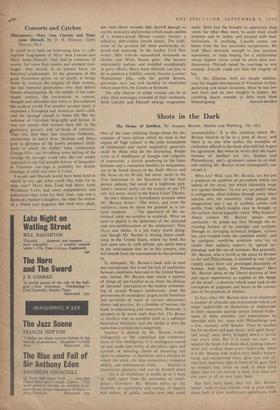Consorts and Catches
11.1 could have been an interesting idea to yoke together biographies of Mary Ann Lincoln and Mary Anne Disraeli. They had in common, of course, far more than names and eminent mar- riages: they shared, in its keenest form, an historical predicament. As the greatness of the great Victorians grows on us yearly, it brings home by contrast the tragedy of their women, the last betrayed generations who died before female emancipation. By the middle of the nine- teenth century, the revolutions in science, thought and education had more or less achieved the modern world. For another seventy years. it remained a European and American men's club, and the damage caused to home life fills the volumes of Victorian biography and fiction. It was not merely that women were left in the „ignorance. poverty and servitude of centuries. They lust now their one vicarious fulfilment, partnership in men's lives. Dickens and Ibsen give us glimpses of the lonely perpetual child- hood to • which the feebler were condemned, George Eliot and Strindberg some inkling of the revenge the stronger could take. But our closest approach to the full possible horror of inequality in Victorian marriage is probably the double bondage of child and man in Lolita.
Lincoln and Disraeli would have been hard to match in any age; what could they hope for in their own? Mary Ann Todd and Mary Anne Wyndham Lewis had more independence and cultivation than most for their time--one was a Kentucky banker's daughter, the other the widow of a Welsh coal magnate. But both were plain,
not very clever women, just shrewd enough to sec the insecurity and promise which made catches of a lantern-jawed Illinois country lawyer, a talkative, debt-ridden Jewish dandy. The fulfil- ment of the promise left them pathetically ex- posed and unstrung. In the hardest Civil War winter, Mrs. Lincoln squandered thousands on clothes and White House galas. She became neurotically jealous, and meddled maddeningly in party affairs. Mary Anne Disraeli, too lazy to be so positive a liability, merely became a covert Westminster joke, with her girlish dresses, garrulous faux pas and inability to remember which came first, the Greeks or Romans.
The only interest of either woman can lie in what their marriages revealed of their husbands. Both Lincoln and Disraeli emerge niagnanim- ously. Both had the breadth to appreciate their wives for what they were, to enter their small interests and be tender and amused with their limitations. If anything. Lincoln conies out better from the less successful compromise. He took Mary seriously enough to lose patience sometimes, to keep hoping for a relationship whose highest virtue could be more than con- descension. Disraeli raised his marriage to wry comedy. Lincoln could not hide the tragedy of his.
To Mr. Elleston, both are simple oddities, cues for magpie descriptions of Victorian clothes, gardening and social occasions. Since he has few new facts and no new insights to impart, his rambling essays amount to little more than


































 Previous page
Previous page